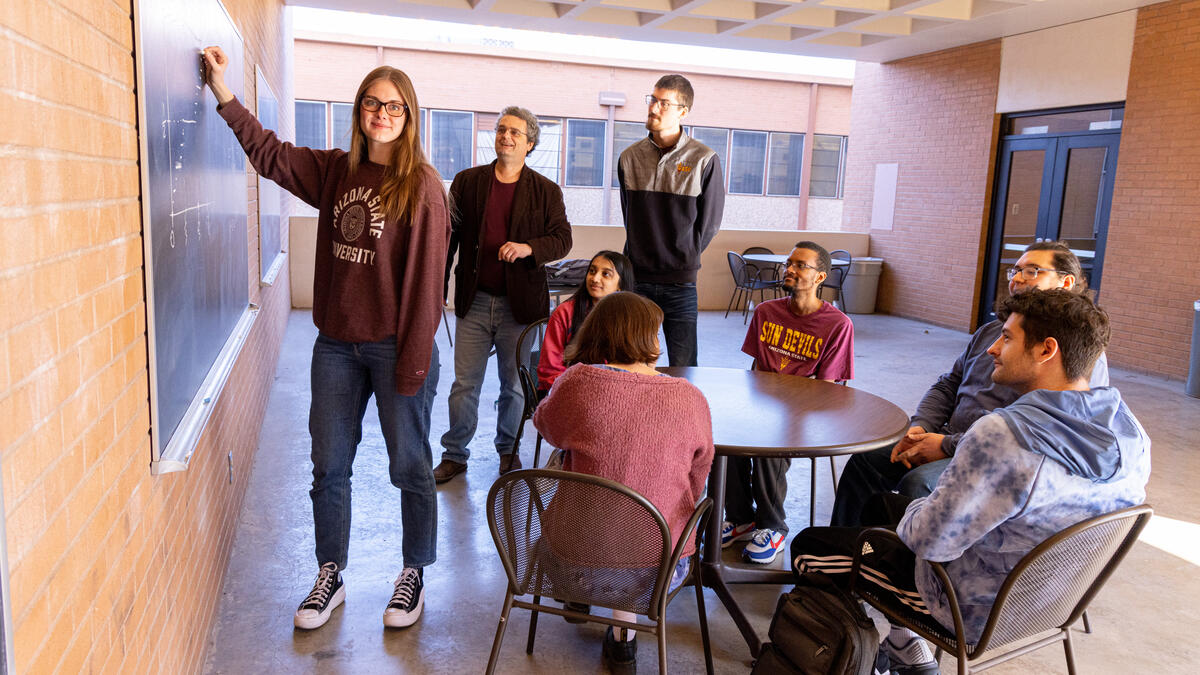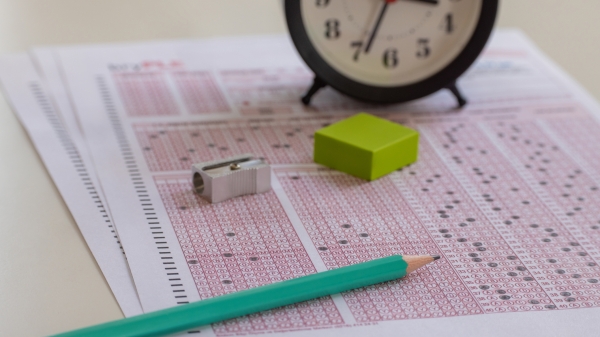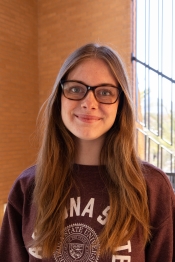Data science grad plans to bring passion and expertise back to Minneapolis

Katelynn Brandwick leads a discussion with other data science students.
Editor’s note: This story is part of a series of profiles of notable spring 2024 graduates.
Bloomington, Minnesota, native Katelynn Brandwick is graduating summa cum laude from Barrett, The Honors College with a Bachelor of Science in data science from the School of Mathematical and Statistical Sciences.
Her decision to attend Arizona State University was an easy one, once she discovered she would receive full tuition as a National Merit Scholar.
“I realized I had the opportunity to attend college out of state and experience a new environment while not paying more than I would if I attended university in-state. I was also drawn in by Barrett, The Honors College, and the unique opportunities it provided through the thesis project, Human Event class and other special topics honors classes,” she said.
Being a part of ASU’s data science program opened many opportunities for research and internships, including participating in a two-semester long project for the company Superfluid DX, which was a collaboration with Purdue's The Data Mine program and ASU's School of Mathematical and Statistical Sciences. Brandwick’s team worked on creating an RNA-Sequencing classifier for Alzheimer’s disease.
“In the Superfluid DX project, teamwork was essential,” said Clinical Assistant Professor Marko Samara. “Katie showed her maturity, work ethic and above all collaborative skills, and her team of Purdue and ASU students did a superb job.”
For her Barrett honors thesis she used a variety of machine learning approaches to create predictive models for B Corporation certification. The sustainability certification is used for assessing environmental, social and governance performance in the corporate world. Brandwick’s research aimed to understand the relationship between a corporation’s characteristics — such as market, size, country — and the B certification.
ASU’s data science program provides the freedom to choose topics of interest in many of the classes. Since there is data on practically everything, many professors encourage students to find whatever data interests them and use it for their projects.
“I loved this as I was able to not only choose things that interested me but also choose topics that I thought aligned well with my future career goals and would be helpful experience to have under my belt,” Brandwick said.
She also served as the president of the Devil Data Science student club and encouraged more female students to join the club.
As she started planning for her future career, she attended the Mathematics, Statistics and Data Science Career Day hosted by the school each fall, where she learned about consulting firm Mercer.
“I talked with a representative at career day and had a great conversation, then decided I wanted to apply afterwards," she said.
She plans to return to Minneapolis to start her career as an informatics data analyst in Mercer’s Government Human Services Consulting team, where she will analyze health care and insurance data related to state Medicaid programs.
We asked her to tell us more about her experiences at ASU.
Question: What was your “aha” moment, when you realized you wanted to study the field you majored in?
Answer: My "aha" moment for data science was taking (Calculus) 3 my freshman year when I realized that while I really enjoyed math, I wanted to do something applied versus theoretical. I like to code and so I landed on data science.
Q: What’s something you learned while at ASU — in the classroom or otherwise — that surprised you, that changed your perspective?
A: I learned the value of diversifying your education. I love data science, but I have also taken classes in film, sustainability, meditation, yoga, piano, etc., and it has made me much more well-rounded. There are so many cool classes at ASU — especially the special topics honors courses for Barrett students — and learning to think critically about different topics has helped me become better at data science.
Q: Which professor taught you the most important lesson while at ASU?
A: I have learned a lot from Dr. Marko Samara in my time at ASU, as he is the advisor of the Devil Data Science club, was my thesis director and I took DAT 402 and capstone with him. From him I have learned to see the bigger picture when approaching a data science problem to determine the best methods to apply. Additionally, I have learned to emphasize the purpose of the research I am doing to convey the most meaningful results.
Q: What’s the best piece of advice you’d give to those still in school?
A: The best piece of advice I’d give to people still in school is to stay busy! This is a time filled with so many opportunities, many of which are only available during the few years of college. I also find it easier to stay on top of my schoolwork when I know my time isn’t infinite. When you have other things on your schedule — work, research, clubs, sports — it encourages you to work harder on your schoolwork and not procrastinate. Also having things to look forward to — lunch with friends, hiking, pool days, travel — will keep you motivated in school.
Q: What is most misunderstood about mathematics by the general public?
A: That if you aren’t an engineer or math teacher that you won’t need math after you are finished with school. I had a high school teacher equate doing math for people who won’t be working in the field as an athlete doing strength training. Players aren’t doing situps or bench presses on the field, but building muscles is important, just like training your brain is important no matter what work you do. Math is an important way to train your brain and become better at logic and reasoning, which helps you in your everyday life no matter your career.
Q: What was your favorite spot on campus, whether for studying, meeting friends or just thinking about life?
A: My favorite spot is the tables in between the Student Services building and Moeur building. I like these tables because there are a lot of trees covering them, as well as an herb garden and a lot of pretty flowers that smell wonderful in the spring. This is my favorite spot to spend time between class reading.
Q: If someone gave you $40 million to solve one problem on our planet, what would you tackle?
A: I would tackle climate change. It is a problem I am passionate about — in addition to my own interest, I live with three sustainability majors — and one that I think the clock is ticking on. It also irks me that the people with the most power to do something about climate change are the ones who will feel its effects last. Those in developing countries or without access to resources will take the brunt of the extreme weather and pollution before the wealthy do, so if I had $40 million I would try my best to lower pollution and CO2 emissions.
Q: What are your best memories of your time here in the School of Mathematical and Statistical Sciences?
A: My favorite memories from (the school) are from the Devil Data Science club, where I made many friends and got the opportunity to network with people with similar interests and goals. Additionally, I also had a lot of fun volunteering at the (school's) booth at Homecoming weekend, playing math games and meeting a lot of new people.
More Sun Devil community

Tested tips for taking exams
With May quickly approaching, many students are starting to prep for their most important tests of the year — final exams.Toni Miceli, the inaugural director of the bar exam success program at…

School of Transborder Studies celebrates 15th anniversary
During the summer before his freshman year at Arizona State University, Salvador Macias participated in the AGUILA Youth Leadership Institute, a college access organization designed to help young…

Barrett program unlocks study abroad for first-year honors students
Twenty first-year students from Barrett, The Honors College at Arizona State University are spending their second semester studying abroad in Rome, Italy.Traveling in a tight-knit honors community…


